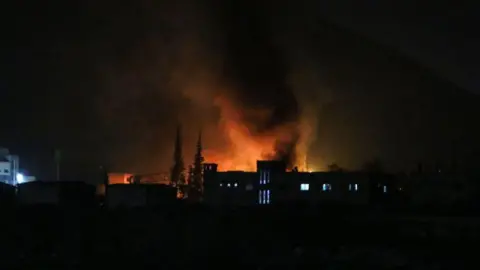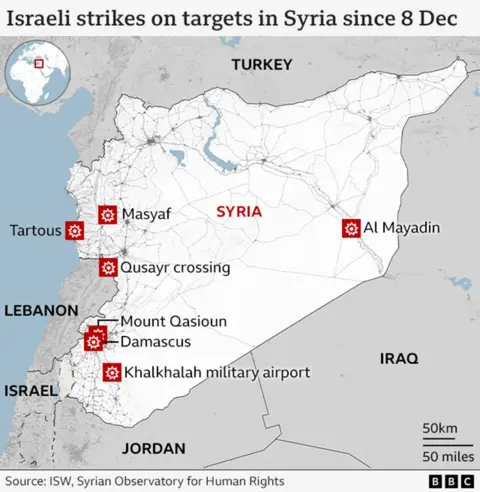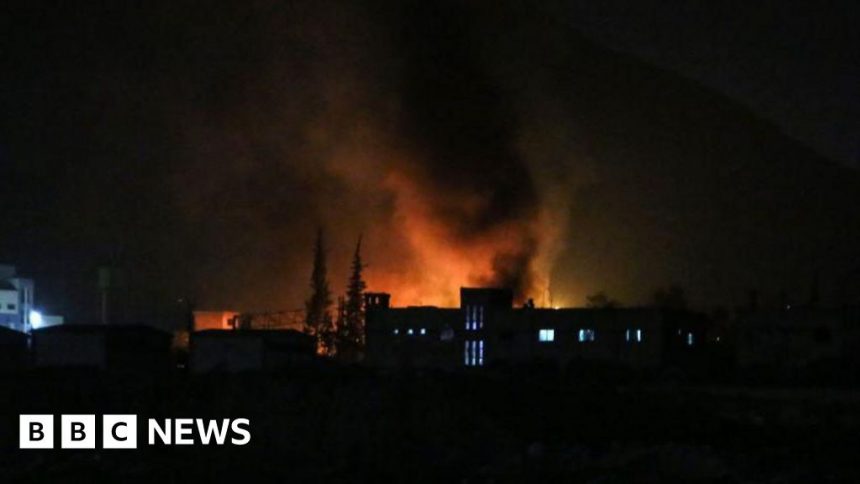More than 300 Israeli strikes on Syria since fall of Assad, reports say
 Getty Images
Getty ImagesIsraeli warplanes have reportedly carried out hundreds of airstrikes across Syria, including on the capital, Damascus.
The UK-based Syrian Observatory for Human Rights (SOHR) says it has documented more than 310 strikes by the IDF since the fall of the Assad regime on Sunday.
The strikes have targeted military facilities of the Syrian Army, including weapon warehouses, ammunition depots, airports, naval bases and research centres.
Israel says its actions are to prevent weapons falling “into the hands of extremists” as Syria transitions into a post-Assad era.
The SOHR reported that the attacks spanned Aleppo, Damascus and Hama, with more than 60 taking place overnight between Monday and Tuesday alone.
Reports say that many of the facilities hit have not merely been damaged, but completely destroyed.
Rami Abdul Rahman, the founder of the SOHR, described the impact of the strikes as destroying “all the capabilities of the Syrian army” and said that “Syrian lands are being violated”.
The IDF denied that its troops had strayed into Syrian territory, telling the BBC that reports of tanks near Damascus are “false”.
“IDF troops are stationed within the buffer zone, as stated in the past,” a spokesperson said.
On Monday, the Israeli military released photos of its troops who crossed from the Israeli-occupied Golan Heights into the demilitarised buffer zone in Syria where UN peacekeepers are based.
The IDF seizure of Syrian positions in the buffer zone was a “temporary defensive position until a suitable arrangement is found”, Israeli Prime Minister Benjamin Netanyahu has said.
“If we can establish neighbourly relations and peaceful relations with the new forces emerging in Syria, that’s our desire. But if we do not, we will do whatever it takes to defend the State of Israel and the border of Israel,” he said on Monday.

Asked about the IDF strikes on Monday night, Israeli Foreign Minister Gideon Saar said Israel was concerned only with defending its citizens.
“That’s why we attack strategic weapons systems like, for example, remaining chemical weapons or long-range missiles and rockets in order that they will not fall into the hands of extremists,” he said.
On Monday, the UN’s chemical watchdog warns authorities in Syria to ensure that suspected stockpiles of chemical weapons are safe.
It is not known where or how many chemical weapons Syria has, but it’s believed former President Bashar al-Assad kept stockpiles.
- BBC correspondent: Assad’s police threatened to bury me and my reporting. Now I’m back, and free
- What comes next: Shaken by Assad’s sudden fall, Syria faces seismic turning point
- In maps: How did anti-Assad rebels take control?
- Saydnaya Prison: Syria rescuers end search for secret cells in notorious prison
- Refugees: Syrian asylum seekers in limbo as countries stop applications
Israel’s attacks come after Syrian rebel fighters captured the capital, Damascus, and toppled Bashar al-Assad’s regime over the weekend. He and his father had been in power in the country since 1971.
Forces led by the Islamist opposition group Hayat Tahrir al-Sham (HTS) entered Damascus in the early hours of Sunday, before appearing on state television to declare that Syria was now “free”.







